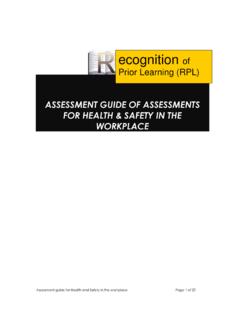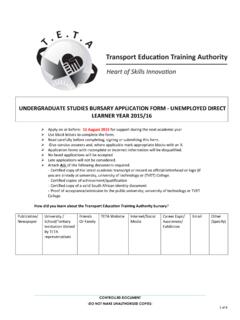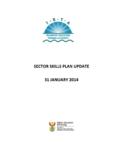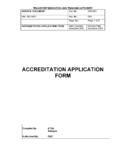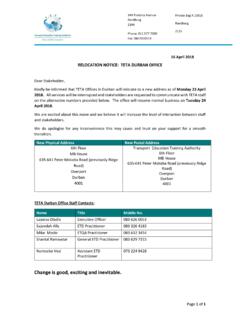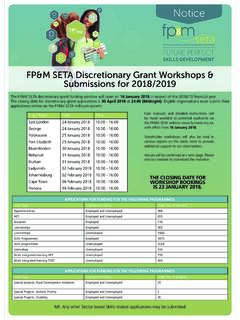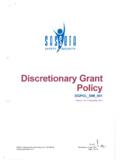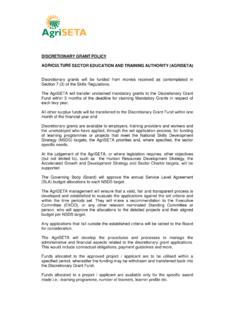Transcription of 1. WHO MAY APPLY FOR DISCRETIONARY GRANTS?
1 TRANSPORT EDUCATION TRAINING AUTHORITY DISCRETIONARY grants GUIDELINES 2018 - 2019 APPLYING FOR DISCRETIONARY GRANT FUNDING - Due to limited funding, guidelines had to be carefully developed so as to provide wide information regarding the DISCRETIONARY Grant Funding Window for 2018-2019. The criteria is fairly elaborated and seek to clarify qualifying applicants and all the necessary requirements before an application is sent through.
2 1. WHO MAY APPLY FOR DISCRETIONARY grants ? In pursuit of delivery of skill training that addresses Transport Sector needs, as documented in the Sector Skills Plan and articulated in our Annual Performance Plan, the Transport Education and Training Authority (TETA) hereby invites applications from the following Stakeholders and legal entities, who fall within the TETA scope: Levy-paying Employers within the transport sector; Accredited Providers; Public Training Providers; these include Universities, Universities Of Technology and TVET Colleges; Government Departments & entities Trade Unions for the benefit of educating their members to strengthen skills development in the Transport Sector; State Owned Enterprises; Institute Sectorial Occupational Excellence Exempted Non-Levy Paying Entities that include Community Based Organisations, Non-Government Organisations and Community Based Cooperatives.
3 2. SCOPE OF APPLICATIONS Applications for PIVOTAL programmes in support of people with disabilities and rural areas are especially encouraged. It is critical to consult the NSDS III and the TETA Sector Skills Plan in the preparation of applications. Application forms and other relevant documents are available on TETA s website at , under the heading: DISCRETIONARY Grant Funding Window 2018/2019 All applications are to be completed in full, either on a DISCRETIONARY Grant Application Form or completely captured on the website. Applications to indicate which subsector they are applying to. Subsectors are listed below: 1.
4 Aerospace Chamber 5. Rail Chamber 2. Forwarding & Clearing Chamber 6. Road Freight Chamber 3. Freight Handling 7. Road Passenger Chamber 4. Maritime Chamber 8. Taxi Chamber It is of utmost importance that stakeholders take note of the following definitions to ensure the correct interpretation and application thereof: Internship: refers to a workplace-based experiential learning opportunity that is generally offered as a supervised programme to supplement formal study completed.
5 Workplace Experience: refers to a workplace-based experiential learning opportunity for a learner/student to complete their qualification. Candidacy Programme - means the structured work experience component part of an occupational qualification as determined by the relevant professional body and may follow the completion of an academic qualification required for access to the assessment for the issuing of a professional designation. This may lead to the designation registered on the National Qualification Framework (NQF) Learnerships - A learning programme as defined in the Learnership Regulations published in Government Gazette 30010 of 29 June 2007.
6 Skills Programmes - an occupation-based learning programme aimed at building skills that have economic value, and which incorporates at least one unit standard. It is registered by a SETA and delivered by an accredited training provider. PREFERENCE WILL BE GIVEN TO APPLICATIONS THAT ADDRESS THE FOLLOWING TOP PRIORITY SKILLS, AS IDENTIFIED IN THE TETA SECTOR SKILLS PLAN: OCCUPATION SPECIALISATION INTERVENTION QUANTITY TO BE SUPPORTED Mechanical Engineers Air-conditioning, Heating and Ventilation (including fire) Engineer; Automotive Engineer; Diesel Engineer; Fluid Mechanics Engineer; Forensic Engineer; Heating and Ventilation Engineer; Machine Design and Development Engineer; Maintenance Management Engineer; Mechanical Engineer (Mines); Mechatronics Engineer; Piping Engineer.
7 Pressurized Vessels Engineer; Rotational Plant Engineer, Structural Steel Engineer; Thermodynamics Engineer; Transportation Systems Engineer Bursary ( Employed) 30 Electrical Engineers Control Engineer; Electrical Design Engineer; Electrical Engineer (Mines); Electric Power Generation Engineer; Electromechanical Engineer; Illumination Engineer; Power Distribution Engineer; Power Systems Engineer; Power Transmission Engineer; Railway Signal Engineer Bursary 20 Diesel Mechanics Diesel Electrical fitter; Diesel Fitter mechanic; Diesel Fuel Injection Mechanic; Diesel Fuel Injection Technician; Diesel Injector; Field Service Technician (diesel); Truck Mechanic; Apprenticeships 150 Transportation Electricians Auto Electrician; Automotive Electrician; Automotive Electrical Fitter; Autotronics Technician; Locomotive Electrician; Ships Electrician; Transport Electrician; Vehicle Electrician; Aircraft Electrician Apprenticeships 50 Mechanical Engineering Technicians Aeronautical; Automotive Engineering Technician; Fuel Cell Technician; Marine Engineering Technician; Naval Technician; Mechanical Instrument Technician.
8 Apprenticeships 30 Bursary 10 Facilities manager Facilities Supervisor; Campus Administrator/Supervisor Bursaries 20 Supply And Distribution Managers Acquisitions Manager; Depot Manager; Freight Forwarding Customs Clearing Manager; Freight Manager; Goods Clearance Manager; Parts Manager; Procurement Manager; Purchase Manager; Supply Chain Executive; Supply Chain Manager; Supply Lead Manager Learnerships( Employed) 50 Ship s Engineers Chief engineer (< 750kW port operations), Chief engineer (< 1500kW port operations), Chief engineer officer (port operations), Engineer officer, Second engineer (< 3000kW), Chief engineer (< 3000kW), Second engineer, Chief engineer, Electro technical officer, Chief engineer officer (special grade) Bursary 10 Learnership 10 Workplace Experience 10 Logistics Managers Dispatch Logistics Manager Supply Chain Management Learnerships (for employed learners)
9 50 Drivers Freight Operator, Lorry Driver, Tanker Driver, Truck Driver (general), Tilt Tray Driver, Petrol Tank Driver, Cement Mixer Driver, Road Train Driver, Logging Truck Driver, Plan Operator Learnership 130 IN ADDITION TO THE ABOVE OCCUPATIONS/QUALIFICATIONS, APPLICANTS CAN APPLY FOR THE BELOW INTERVENTIONS TO ADDRESS THE SCARCE AND CRITICAL SKILLS LIST INDICATED IN OUR SECTOR SKILLS PLAN. PREFERENCE WILL BE GIVEN TO QUALIFICATIONS WITHIN TETA SCOPE. REFER TO ANNEXURE 1 FOR THE LIST OF HARD TO FILL VACANCIES. PIVOTAL PROGRAMME TARGET NUMBER OF LEARNERS Bursary (Employed Learners) 10 Learnership( Employed Learners) 1 240 Learnership( Unemployed Learners) 1 500 Apprenticeship/Artisans 320 HET Graduates placed on workplace experience 170 TVET learners on Workplace Experience 160 Internships 300 Skills Programme (Employed Learners) 500 Skills Programme (Unemployed Learners) 850 Recognition Of Prior Learning Within Transport Sector 50 Candidacy Programmes 20 Adult Basic Education & Training (AET Employed) 200 Adult Basic Education & Training (AET Unemployed)
10 300 Preference will be given to applications prioritizing previously disadvantaged beneficiaries using the percentages below: 85% - Black 54% - Women 4% - People with disabilities Youth: Young people are the most disadvantaged. Single largest category of unemployed is under 35. Class: Application should address social inequalities. HIV/AIDS pandemic: Skills development initiatives should incorporate our fight against this pandemic and management of HIV and AIDS in the workplace. 3. WHEN TO APPLY FOR DISCRETIONARY grants The DISCRETIONARY Grant applications should be submitted as indicated below by 02nd October 2017.

